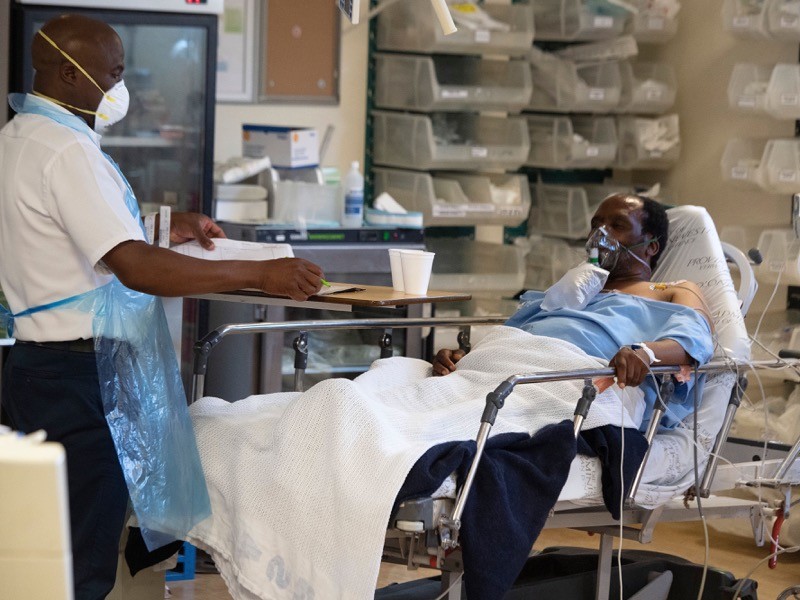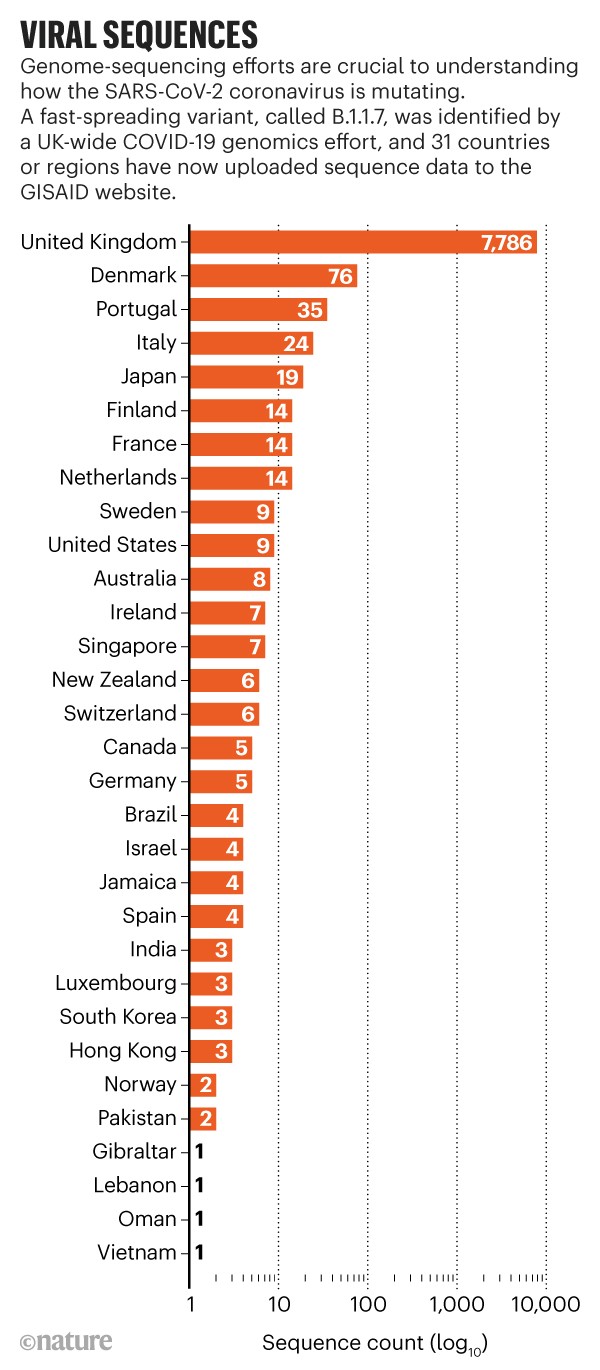As concern grows over quicker-spreading variants of coronavirus, labs throughout the world are racing to unpick the biology of these viruses. Experts want to comprehend why SARS-CoV-2 variants discovered in the United Kingdom and South Africa seem to be spreading so immediately, and irrespective of whether they may diminish the efficiency of vaccines or prevail over pure immunity and lead to spate of reinfections.
“Many of us are scrambling to make feeling of the new variants, and the million-greenback problem is what importance this will have for the performance of vaccines that are at this time getting administered,” states Jeremy Luban, a virologist at the University of Massachusetts Health-related University in Worcester.
The 1st lab effects are trickling in and a lot of additional are predicted in coming days, as researchers rush to probe the viral variants and their constituent mutations in mobile and animal products of SARS-CoV-2, and examination them towards antibodies elicited by vaccines and normal bacterial infections. A preprint posted on 8 January1 found that a mutation shared by both of those variants did not alter the action of antibodies generated by people today who acquired a vaccine formulated by Pfizer and BioNtech. Info on other mutations and vaccines are predicted quickly.
“By upcoming 7 days we’ll have considerably more facts,” states Vineet Menachery, a virologist at the College of Texas Health-related Department in Galveston, whose team is gearing up to review the variants.
Underlying biology
Researchers spotted equally coronavirus variants in late November and early December 2020 via genome sequencing. A Uk-extensive COVID-19 genomics exertion determined that a virus variant now acknowledged as B.1.1.7 experienced been driving surging situation quantities in the southeast of England and London the variant has now spread to the rest of the Uk and has been detected in tens of international locations throughout the world (see ‘Viral sequences’).
And a staff led by bioinformatician Tulio de Oliveira at the University of KwaZulu-Natal in Durban, South Africa, connected2 a speedy-growing epidemic in the country’s Eastern Cape Province to a coronavirus variant they connect with 501Y.V2. The British isles and South African variants emerged independently, but both of those carry a bevy of mutations — some of them related — in the coronavirus spike protein, through which the virus identifies and infects host cells and which serves as the prime concentrate on of our immune reaction.
Epidemiologists finding out the growth of the B.1.1.7 variant in the United Kingdom have estimated that it is around 50% far more transmissible than existing viruses in circulation3 — an insight that contributed to the United kingdom government’s conclusion to enter a third nationwide lockdown on 5 January. “The epidemiology has definitely shown us the way right here,” states Wendy Barclay, a virologist at Imperial Higher education London and a member of a team advising the British isles govt on its response to B.1.1.7.
But it is important, Barclay provides, that scientists figure out the underlying biology. “Understanding what houses of the virus make it a lot more transmissible enables us to be extra informed about coverage conclusions.”
One particular challenge is disentangling the results of the mutations that distinguish the Uk and South African lineages from their near kinfolk. The B.1.1.7 variant carries 8 alterations that impact the spike protein, and several additional in other genes samples of the South African 501Y.V2 variant have up to 9 adjustments to the spike protein. Doing the job out which are accountable for the speedy spread of the variants and other homes is an “enormous challenge”, states Luban. “I really don’t believe there is a single mutation that is accounting for all of it.”
Substantially of the concentration is centred on a modify to the spike protein that is shared by the two lineages, referred to as N501Y. This mutation alters a part of spike, called the receptor binding area, that that locks on to a human protein to permit an infection. A single speculation hinted at in past experiments is that the N501Y improve will allow the virus to connect to cells much more strongly, generating infection less difficult, says Barclay.
The N501Y mutation is one particular of several that Menachery’s staff is getting ready to examination in hamsters, a product for SARS-CoV-2 transmission. He was element of a team that described4 past calendar year that a different mutation to the spike protein enabled viruses to increase to larger degrees in the higher airways of hamsters, in contrast with viruses lacking the transform. “That’s what I’m expecting with these mutations,” he suggests. “If which is the case, that is heading to be driving their transmissibility.” A report released in late December supports that speculation: it located additional SARS-CoV-2 genetic substance in the swabs of individuals infected with the B.1.1.7 variant, compared with people contaminated with viruses missing the N501Y improve.
Antibody exams
The fast distribute of the variants has triggered attempts to have their unfold, by lockdowns, border limits and heightened surveillance. Including to the sense of urgency is the get worried that the variants could weaken immune responses activated by vaccines and previous infection. The two variants harbour mutations in regions of the spike protein that are identified by powerful virus-blocking ‘neutralizing’ antibodies: the receptor binding area and a part named the N-terminal domain, claims Jason McLellan, a structural biologist at the College of Texas-Austin, who scientific tests coronavirus spike proteins. This raises the possibility that antibodies to these regions could be affected by the mutations.
As a end result, academic and govt researchers and vaccine developers are now performing all over the clock to handle the question. “This is nuts speed,” suggests Pei-Yong Shi, a virologist at UTMB who is collaborating with Pfizer to analyse blood from members in their profitable vaccine demo. In the 8 January preprint, the group observed minor difference in the potency of antibodies created by 20 individuals towards viruses carrying the N501Y mutation, compared with viruses missing the improve. The crew is now inspecting the results of other mutations in the variants.
In a similar experiment, a crew led by his colleague Menachery also found that the 501Y mutation, at minimum, did not significantly affect the action of neutralizing antibodies in convalescent serum – the antibody-made up of part of blood taken from people who have recovered from COVID an infection. This indicates that the 501Y mutation is not likely to alter immunity, provides Menachery, who posted the data to Twitter on 22 December.
But other mutations might. Prime amongst people is a different receptor-binding-area mutation that de Oliveira’s crew have recognized in the 501Y.V2 variant, named E484K. His workforce is working with virologist Alex Sigal at the Africa Wellness Investigation Institute in Durban to take a look at the variant from convalescent serum and serum from people who have been vaccinated in trials. The initially benefits from these research need to be general public in a couple of days, says de Oliveira.
Immune escape
There is rising proof that the E484K mutation can allow the virus to escape some people’s immune responses. In a 28 December preprint5, a group led by immunologist Rino Rappuoli, at the Fondazione Toscana Life Sciences in Siena, Italy, grew SARS-CoV-2 in the presence of very low amounts of one person’s convalescent serum. The intention was to pick for viral mutations that evade the numerous repertoire of antibodies created in reaction to an infection. “The experiment was not essentially meant to do the job,” suggests McLellan, a co-author. But within 90 days, the virus experienced picked up 3 mutations that designed it impervious to the person’s serum — together with the E484K mutation in the South African variant and N-terminal domain alterations observed in it and the Uk variant. “That was astonishing,” says McLellan, because it proposed that the individual’s overall antibody response in opposition to SARS-CoV-2 was directed versus a compact part of the spike protein.
The lab-progressed pressure proved much less resistant to convalescent sera from other folks. But the experiment indicates that mutations this sort of as E484K and N-terminal area changes carried by both variants could affect how antibodies produced by vaccines and preceding infection identify them, states McLellan.
Biotech business Moderna in Cambridge, Massachusetts, which has developed an RNA-based mostly vaccine, has said that it be expecting its jabs to perform versus the Uk variant and that assessments are beneath way.
A pressing query is whether these types of adjustments will change the genuine-earth success of vaccines, suggests Jesse Bloom, a viral evolutionary biologist at the Fred Hutchinson Most cancers Analysis Middle in Seattle, Washington. In a 4 January preprint6, his staff also reported that E484K and numerous other mutations can escape recognition by antibodies in peoples’ convalescent sera to different levels.
But Bloom and other researchers are hopeful that the mutations in the variants won’t considerably weaken the efficiency of vaccines. The pictures are inclined to elicit whopping degrees of neutralizing antibodies, so a little fall in their efficiency towards the variants may possibly not make any difference. Other arms of the immune response induced by vaccines, these kinds of as T-cells, may not be impacted. “If I had to bet right now, I would say the vaccines are likely to
remain successful for the factors that definitely count — holding people today from getting deathly unwell,” claims Luban.


